MercoPress. South Atlantic News Agency
Tag: US Federal Reserve
-
Thursday, October 11th 2018 - 09:08 UTC
US markets suffer their sharpest one-day fall: fears of interest rates, inflation and trade tensions
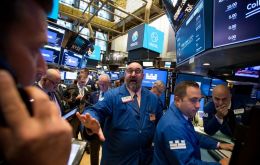
United States share markets suffered on Wednesday their sharpest one-day falls in months, as fears about rising interest rates, inflation, trade tensions intensified. The tech-heavy Nasdaq led the declines, sliding 4%, or 315.9 points, to 7,422. The Dow Jones and S&P 500 also fell by more than 3%, with losses accelerating towards the end of the day. Netflix fell 8%, while Amazon slid 6%.
-
Friday, October 5th 2018 - 08:36 UTC
Argentine Peso slips on Thursday on prospects of higher US interest rates
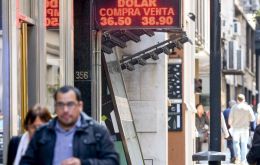
Argentina’s Peso fell on Thursday, pressured by the recession-hit country’s dismal inflation outlook and higher U.S. interest rates that have pushed capital away from riskier emerging markets and toward the greenback, local traders said. The peso shed 1.85% to close at 38.4 per dollar after having gained 9.58% over the previous three days under a freshly-renegotiated International Monetary Fund financing deal that calls for tougher fiscal and monetary policy measures.
-
Friday, September 28th 2018 - 08:58 UTC
Brazilian currency strengthens below 4 to the dollar: first time in five weeks
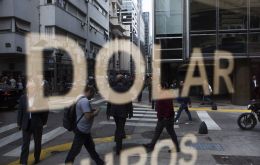
The Brazilian currency dipped under four Real to the dollar for the first time in five weeks at close on Thursday as the markets reacted favorably to the emergence of two clear presidential election frontrunners. The Real closed at 3.99 to the US dollar just two weeks after hitting a record low of almost 4.2 to the dollar -- it's lost around 17% since the start of the year.
-
Wednesday, September 26th 2018 - 21:13 UTC
Fed raises interest rate and announces a third increase this year
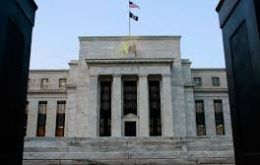
The United States Federal Reserve announced on Wednesday, after a two-day policy meeting, that it would raise interest rates for the third time this year. The decision, which had been widely expected, raised the federal funds rate by 25 basis points, to a range of 2% to 2.25%.
-
Thursday, August 23rd 2018 - 08:52 UTC
Federal Reserve ready to raise interest rates, according to minutes
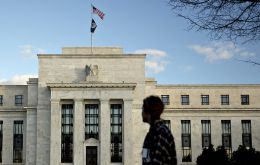
United States Federal Reserve officials discussed raising interest rates soon to counter excessive economic strength but also examined how global trade disputes could batter businesses and households, minutes of the U.S. central bank’s last policy meeting showed.
-
Wednesday, August 22nd 2018 - 08:40 UTC
Brazil's Real plunges past four to the US dollar, first time since March 2016
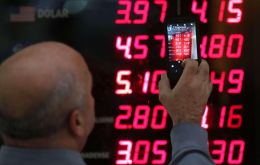
Most emerging market currencies worldwide rallied on Tuesday after U.S. President Donald Trump criticized the head of the Federal Reserve for raising interest rates, while Brazil's Real fell to its lowest in more than two years on political concerns.
-
Thursday, June 14th 2018 - 08:13 UTC
Fed raises basic rate to 2%; anticipates further increases amid strong economic growth
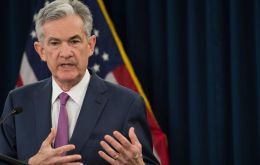
The US Federal Reserve raised the benchmark lending rate on Wednesday, the second increase of the year, and signaled it will be more aggressive about rate increases this year and next amid “strong” economic growth. The unanimous vote brings the federal funds rate to a range of 1.75 to 2%, but the quarterly economic forecasts show central bankers now expect the rate to end the year at 2.4% rather than the 2.1% projected in March.
-
Friday, May 11th 2018 - 08:50 UTC
Brazil inflation in April below official target; another interest rate cut expected

Brazil's inflation rate unexpectedly slowed in April and kept far below the official target, suggesting a recent period of currency weakness is unlikely to keep the central bank from cutting interest rates next week.
-
Monday, May 7th 2018 - 09:07 UTC
Fed fines Goldman Sachs Group for unsound foreign exchange trading
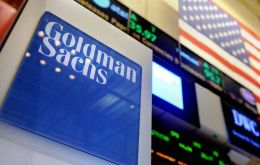
The United States Federal Reserve Board announced that it has fined The Goldman Sachs Group, Inc., US$ 54.75 million for the firm's unsafe and unsound practices in its foreign exchange (FX) trading business.
-
Wednesday, April 25th 2018 - 09:14 UTC
The yield for 10-year US Treasury bonds breaks 3% yield rattling markets
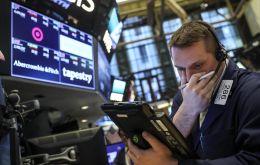
The 10-year U.S. Treasury yield has broken through the “psychologically important” level of 3%, leaving analysts contemplating what it could mean the future of asset markets and, more importantly, the global economy. The yield on the benchmark bond — which helps to set prices for debt instruments all over the world — inched past 3% on Tuesday, a level that many market players deem dangerous for investments and the economy.
